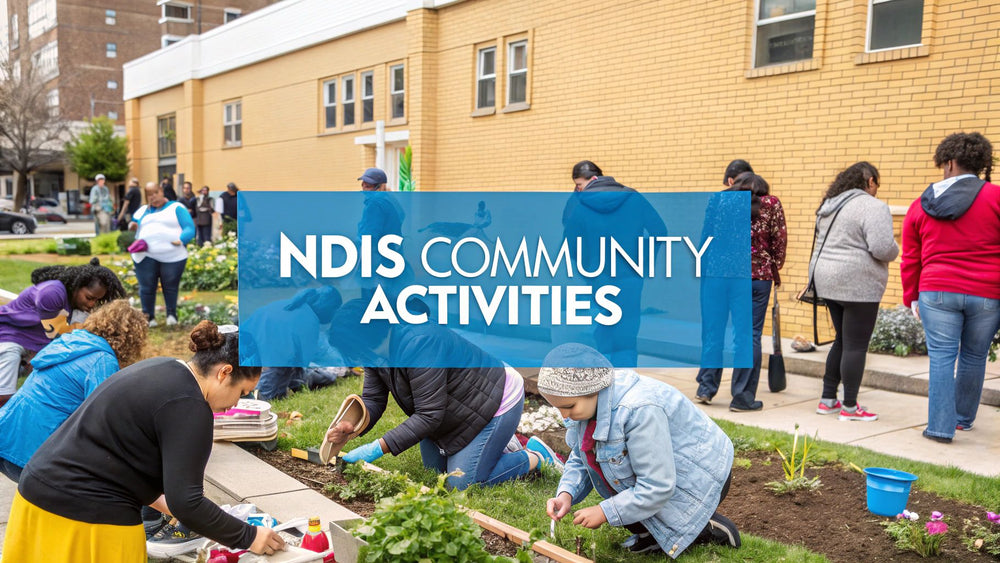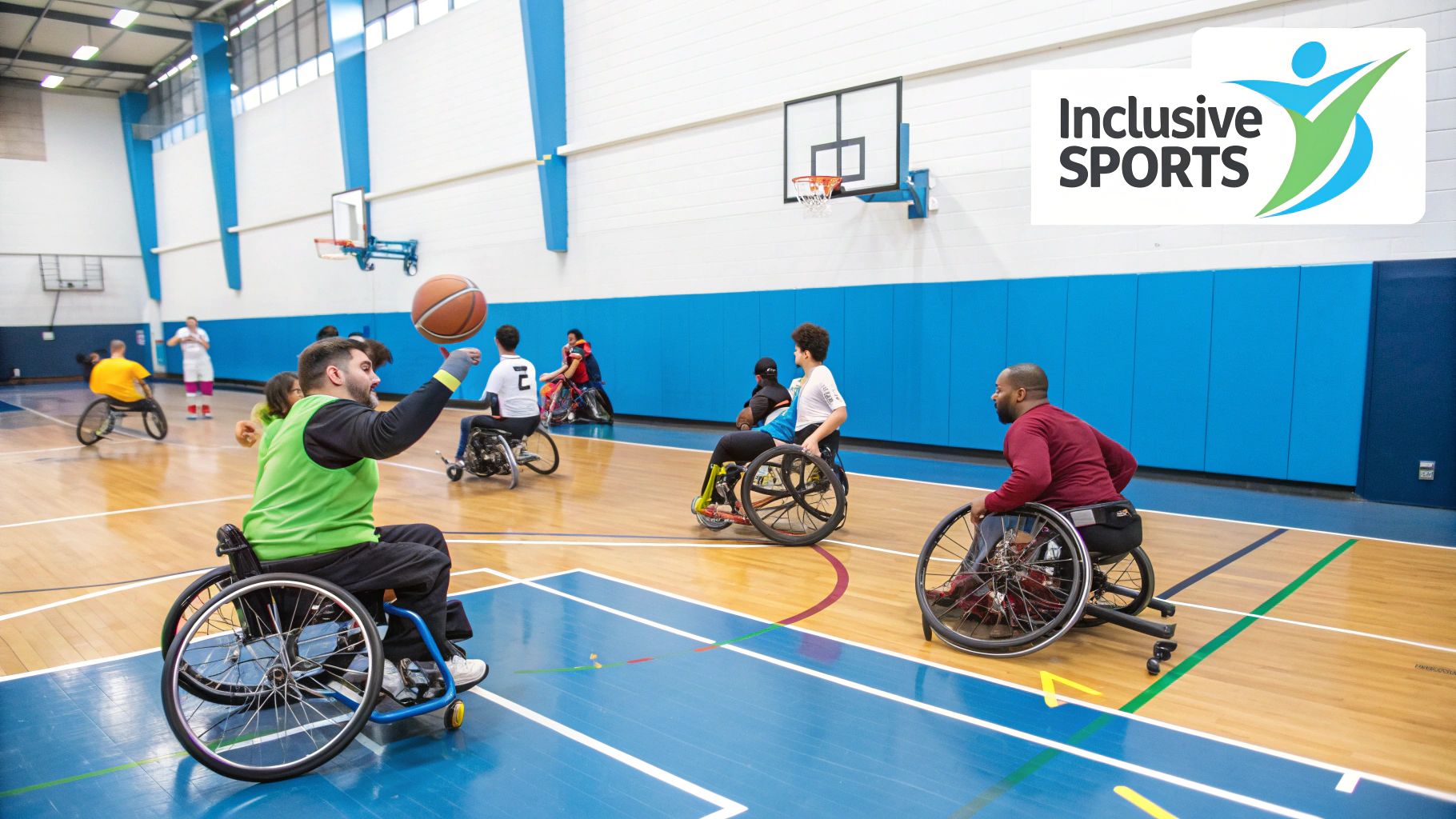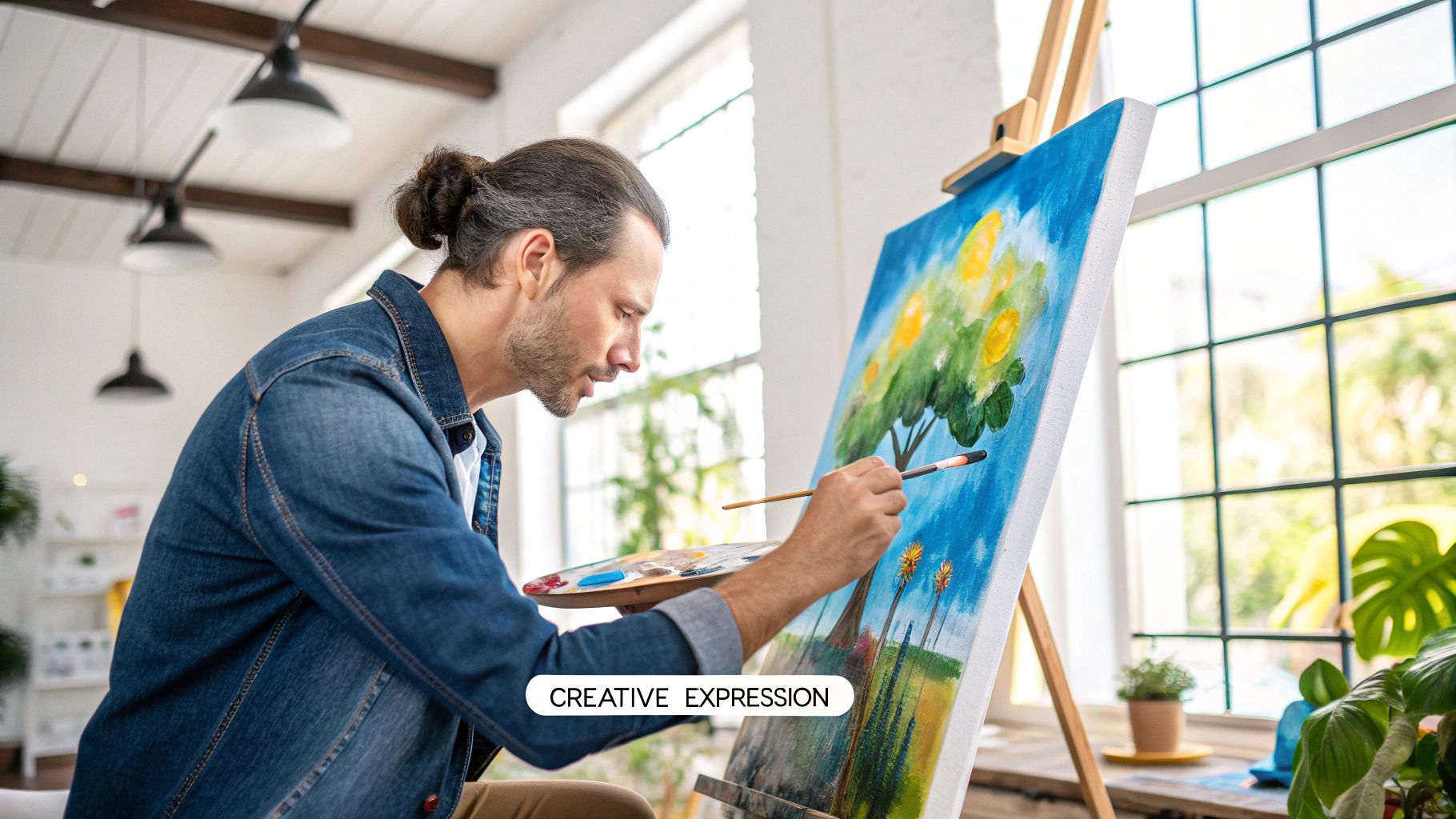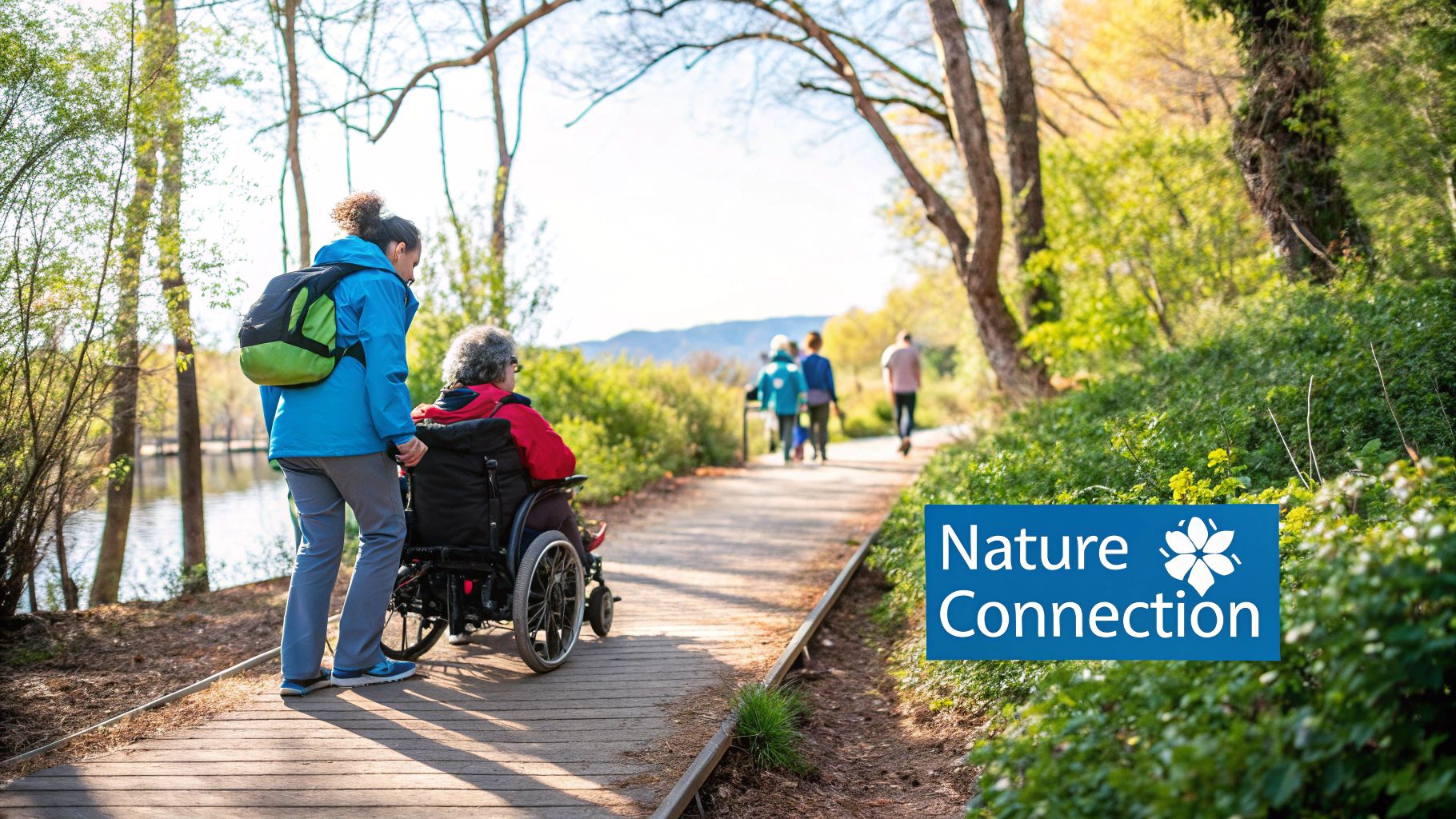7 NDIS Community Participation Activities to Try in 2025

Community participation is more than just leaving the house; it’s about connecting with people, pursuing passions, and building a life filled with purpose and joy. For NDIS participants in South Australia, the right activities can be transformative. They foster independence, enhance skills, and create lasting friendships, but knowing where to start or what's possible can be the biggest hurdle.
This guide is designed to change that. We will explore a diverse range of NDIS community participation activities, moving beyond the obvious to offer practical, engaging options that cater to various interests and abilities. Whether you're looking to learn a new skill, join a team, give back to your community, or simply meet like-minded people in Adelaide or regional SA, this list provides the inspiration you need.
We will break down what each type of activity involves, its unique benefits, and how you can get started. From joining a local sports club to volunteering for a cause you care about, the goal is to show you the breadth of opportunities available. Let's dive into the activities that can help you or your loved one thrive.
1. Community Sports and Recreational Activities
Engaging in community sports is one of the most effective ndis community participation activities for building physical health, fostering social connections, and boosting self-confidence. These are structured physical programs that bring NDIS participants and the wider community together through inclusive sports clubs, adaptive programs, and recreational fitness groups. Far from just a game, these activities are intentionally designed to be accessible, often featuring modified rules, specialised equipment, and supportive coaching to ensure everyone can participate meaningfully.

The primary goal is to create an environment where participants can develop new skills, enjoy friendly competition, and form lasting friendships based on shared interests. The benefits extend beyond physical fitness; regular participation helps improve motor skills, enhance mental wellbeing, and develop crucial social skills like teamwork and communication in a fun, low-pressure setting.
How to Get Started
Finding the right fit is key to a positive experience. A great first step is to explore organisations dedicated to inclusive sports.
- Explore Local Clubs: Many local sporting clubs in South Australia now offer "All Abilities" programs. Check with your local council or organisations like Special Olympics Australia for programs near you.
- Consider Adaptive Sports: For those with specific physical disabilities, look into adaptive sports. Examples include wheelchair basketball leagues, organised by groups like Disability Sports Australia, or Boccia clubs, which are perfect for individuals with severe physical impairments.
- Request Trial Sessions: Before committing to a full season, ask if the club offers a trial session. This allows the participant to experience the environment, meet the coaches, and decide if the activity truly matches their interests and comfort level.
- Align with NDIS Goals: Ensure the activity aligns with the participant's NDIS plan goals, such as "Increased Social and Community Participation". This is crucial for using NDIS funding to cover associated costs, like fees, specialised equipment, or support worker assistance during the activity.
For more insights on how physical activity enhances overall wellbeing, explore this guide on maintaining an active lifestyle for individuals with a disability.
2. Arts and Creative Workshops
Participating in arts and creative workshops is an exceptional form of ndis community participation activities that nurtures self-expression, develops fine motor skills, and provides a powerful medium for social connection. These community-based programs, which include everything from pottery and painting to drama groups and music therapy, offer a structured yet flexible environment for individuals to explore their creativity. The focus is less on the final product and more on the therapeutic and enjoyable process of creation, making it accessible for all skill levels and abilities.

The core purpose of these workshops is to offer a non-verbal outlet for emotions and ideas while building tangible skills. The benefits are profound, helping to improve concentration, boost self-esteem, and reduce anxiety in a supportive, non-judgemental setting. By working alongside peers with shared interests, participants can form meaningful bonds and enhance their communication skills in a relaxed and engaging way.
How to Get Started
Finding a workshop that resonates with a participant's interests is the first step toward a rewarding creative journey.
- Connect with Arts Organisations: Begin by contacting peak bodies like Arts Access Australia or exploring local community art centres. Many centres in South Australia offer inclusive programs specifically designed for people with disabilities.
- Explore Different Mediums: Consider a variety of artistic forms. This could be a pottery class at a community college, a drama group that builds confidence, or digital art workshops using accessible technology like tablets and styluses.
- Prioritise an Inclusive Environment: When enquiring, ask about the support provided. A good program will use adaptive tools like specialised brush grips, offer various difficulty levels, and have instructors trained to create a supportive, process-focused atmosphere.
- Link to Your NDIS Plan: To use NDIS funding for course fees, materials, or a support worker, the activity must align with a goal in the participant’s plan, such as "developing new skills" or "improving social interaction". Clearly documenting this link is key to a successful claim.
3. Volunteer Work and Community Service
Engaging in volunteer work is one of the most rewarding ndis community participation activities, offering a powerful way to contribute to society, develop valuable skills, and gain a profound sense of purpose. These opportunities allow NDIS participants to apply their talents and passions to support local causes, from environmental conservation to helping at charities, animal shelters, or community events. The focus is on finding a meaningful role that aligns with an individual's interests, fostering both personal growth and community connection.
The primary goal of community service is to create opportunities for participants to make a tangible impact while building their confidence and expanding their social networks. Beyond the act of giving back, volunteering helps develop practical, work-ready skills like communication, organisation, and teamwork. It provides a structured yet supportive environment to interact with new people, learn new routines, and discover hidden strengths.
How to Get Started
Finding a suitable volunteer role involves matching personal interests with community needs. The key is to find an organisation that provides the right level of support.
- Match Roles to Interests: Identify the participant's passions. If they love animals, an animal shelter is ideal. For those who enjoy the outdoors, a community garden or a local "Friends of the Park" group could be a great fit.
- Start with Short-Term Commitments: To build confidence and avoid feeling overwhelmed, begin with one-off events or short-term projects, such as helping at a weekend community festival or a single-day environmental clean-up.
- Contact Volunteer Resource Centres: Organisations like Volunteering SA&NT are excellent resources for finding inclusive and accessible volunteer opportunities across South Australia. They can help connect participants with roles that suit their abilities and goals.
- Document and Celebrate Achievements: Keep a record of the hours contributed, tasks completed, and skills learned. Regularly celebrating these contributions helps reinforce the value of the work and boosts self-esteem.
To discover more about the benefits and find suitable roles, you can learn more about the positive impact of volunteer work for individuals with a disability.
4. Social and Interest-Based Groups
Joining social and interest-based groups is one of the most fulfilling ndis community participation activities for nurturing friendships and personal passions. These gatherings are organised around shared interests, from book clubs and cooking classes to technology meetups, creating natural and relaxed settings for social interaction. Unlike more formal programs, these groups are driven by genuine mutual interests, allowing participants to connect with others on a personal level in a supportive, low-pressure environment.

The main goal is to provide a space where individuals can pursue their hobbies while developing social skills, building confidence, and forming meaningful relationships. The benefits are significant; participants gain a sense of belonging, reduce feelings of isolation, and practise communication skills in a context that is both enjoyable and motivating. For those who prefer a structured yet intimate way to connect, exploring options like Tasmania small group tours can be an excellent option.
How to Get Started
Connecting with the right group is crucial for a rewarding experience. The focus should be on finding an activity that the participant is truly passionate about.
- Explore Local Community Hubs: Start by checking with your local library, community centre, or council. Many offer a wide range of groups, such as gardening clubs at community gardens or book clubs with accessible venues.
- Search Online Platforms: Websites like Meetup.com can be a great resource for finding hobby groups. You can often filter for accessibility or search for groups specifically designed to be inclusive.
- Start Small and Build Confidence: If a participant feels anxious, look for smaller groups to begin with. Regular attendance is key to building familiarity and forming stronger bonds over time.
- Align with NDIS Plan: Ensure the group activity supports the participant's "Increased Social and Community Participation" goals. This allows NDIS funding to cover costs such as course fees, materials, transport, or the assistance of a support worker.
Discover more on how these activities can boost confidence and connection in this guide on inclusive activities to develop social skills.
5. Educational Classes and Workshops
Participating in educational classes and workshops is one of the most empowering ndis community participation activities, offering a pathway to lifelong learning, skill development, and personal growth. These are structured learning programs held within the community, covering everything from TAFE courses and digital literacy workshops to hands-on life skills training. They are specifically designed to be inclusive and accessible, providing a supportive environment for NDIS participants to pursue interests and acquire valuable knowledge.
The core purpose is to build confidence and independence by equipping participants with practical skills relevant to their personal, academic, or vocational goals. The benefits are vast, ranging from improved job readiness and financial literacy to enhanced social interaction and cognitive function. These settings allow individuals to learn alongside peers with shared interests, fostering a sense of accomplishment and community connection.
How to Get Started
Finding a course that aligns with a participant's interests and learning style is the first step towards a rewarding educational journey.
- Explore TAFE and Community Colleges: Institutions like TAFE SA and local community colleges offer a wide range of courses with dedicated disability support services. Look for their inclusive education or "Skills for All" programs.
- Check Local Council and Library Programs: Your local council or library is a fantastic resource for free or low-cost workshops. These often include digital literacy, financial budgeting, and creative writing classes designed for all community members.
- Start with Introductory Courses: To build confidence, begin with a short, introductory-level workshop or a single-session class. This helps the participant get comfortable with the learning environment before committing to a longer course.
- Align with NDIS Goals: Ensure the chosen course supports goals in the NDIS plan, such as "Increased Social and Community Participation" or "Finding and Keeping a Job". This is essential for using NDIS funds for course fees, learning materials, or a support worker to assist during class.
Many of these learning opportunities can be integrated into a structured routine. To see how these activities fit into a broader support framework, you can explore the benefits of an NDIS day program.
6. Community Events and Festivals
Attending local community events and festivals is one of the most vibrant ndis community participation activities available, offering a direct and enjoyable way to connect with the local culture and social fabric. These activities range from large-scale cultural celebrations and music festivals to intimate farmers markets and local fairs. They provide a dynamic environment where NDIS participants can engage with the broader community, explore new interests, and experience diverse sensory inputs in a lively, shared setting.
These events are more than just a day out; they are powerful opportunities for social immersion and cultural education. The core objective is to foster a sense of belonging and active citizenship by encouraging participation in the celebrations that define a community's identity. The benefits are extensive, promoting social confidence, enhancing cultural awareness, and providing a natural context for practising communication and navigation skills in a real-world, stimulating environment.
How to Get Started
Successfully enjoying a community event often comes down to good planning. A thoughtful approach ensures the experience is positive and stress-free.
- Research Accessibility Features: Before you go, check the event's website or contact the organisers to ask about accessibility. Look for information on wheelchair-accessible pathways, quiet zones, accessible toilets, and companion card acceptance. Events like the Adelaide Fringe Festival often publish detailed accessibility guides.
- Plan for Sensory Needs: Festivals can be loud and crowded. Consider visiting during off-peak hours, such as early in the morning, to avoid the biggest crowds. Bringing comfort items like noise-cancelling headphones or sunglasses can help manage sensory overload.
- Establish a Clear Plan: For larger events, it is wise to have a plan. Designate a clear and easy-to-find meeting point in case you get separated. Review the event map beforehand to locate key facilities and plan your route.
- Start Small: If you or the participant is new to large gatherings, start with smaller, more low-key events. A local farmers market or a community craft fair can be a great stepping stone before attending a major music or cultural festival.
For a deeper understanding of how these activities fit into a broader support strategy, you can find more information about NDIS community participation here.
7. Outdoor Adventures and Nature Activities
Connecting with the natural environment is a powerful way to enhance wellbeing, and outdoor adventures are excellent ndis community participation activities for achieving this. These experiences range from gentle bushwalks and community gardening to more adventurous camping trips, all designed to be inclusive and accessible. They provide a unique opportunity for NDIS participants to develop outdoor skills, appreciate nature, and form social bonds away from typical urban settings.
The core purpose of these activities is to facilitate a connection with the environment in a safe, supported, and engaging manner. The benefits are extensive, boosting physical health through movement, improving mental clarity by reducing stress, and fostering a sense of accomplishment. Participants can learn practical skills like navigation or plant identification while also building social confidence in a calm, natural space.
How to Get Started
Embarking on a nature-based activity is about finding the right level of adventure and support. Preparation is key to ensuring a safe and enjoyable experience.
- Start with Accessible Trails: Begin with shorter, well-maintained paths to build confidence. Organisations like National Parks and Wildlife Service South Australia provide detailed information on accessible trails, including surface type and gradient.
- Join a Community Garden: Participating in a community garden is a fantastic, low-impact way to engage with nature and neighbours. Look for local councils or groups that offer raised garden beds or accessible tool libraries.
- Check Accessibility Features: Before visiting any park, beach, or campsite, always check its accessibility features online or by phone. Ask about accessible toilets, pathways, and parking to ensure the location meets specific needs. For those seeking grander nature experiences, activities such as exploring the Kimberley Coast can offer profound engagement with the natural world.
- Use NDIS Funding for Support: Your NDIS plan can be used to fund a support worker to assist during these activities, helping with mobility, safety, and participation. This ensures the focus remains on enjoyment and skill-building.
7-Point Comparison of NDIS Community Activities
| Activity Type | Implementation Complexity 🔄 | Resource Requirements ⚡ | Expected Outcomes 📊 | Ideal Use Cases 💡 | Key Advantages ⭐ |
|---|---|---|---|---|---|
| Community Sports and Recreation | Medium - requires adaptive equipment and coaching | Moderate - specialized gear, venues | Improved physical health, social skills, confidence | Inclusive fitness, team sports, skill development | Health benefits, social connections, structured routine |
| Arts and Creative Workshops | Medium - varied mediums and adaptive tools | Moderate - materials and artist instruction | Enhanced creativity, emotional benefits, fine motor skills | Self-expression, therapeutic use, skill-building | Emotional growth, public recognition, therapeutic value |
| Volunteer Work and Community Service | Low to Medium - supervision and role matching | Low to Moderate - training and support needed | Sense of purpose, work skills, social connections | Community engagement, employment pathways | Builds self-worth, skill development, community impact |
| Social and Interest-Based Groups | Low - peer-led with possible facilitation | Low - venues and minimal materials | Friendship building, reduced isolation, social skills | Pursuing hobbies, social interaction, routine | Strong social networks, belonging, low-pressure setting |
| Educational Classes and Workshops | Medium - structured curriculum and qualified instructors | Moderate - materials, support, certification | New skills, confidence, cognitive stimulation | Lifelong learning, employment preparation | Skill acquisition, independence, accreditation |
| Community Events and Festivals | Medium - large scale, planning, and accessibility | Low to Moderate - event resources | Cultural exposure, social confidence, memorable experiences | Cultural engagement, social inclusion, family activities | Cultural diversity, entertainment, community bonding |
| Outdoor Adventures and Nature Activities | Medium - adaptive gear, safety measures | Moderate - equipment and accessible locations | Mental wellbeing, environmental awareness, physical fitness | Nature connection, adventure, environmental education | Stress reduction, outdoor skills, exploration |
Your Journey to Community Connection Starts Here
Exploring the world of NDIS community participation activities is not just about filling your schedule; it's about weaving a richer, more vibrant tapestry for your life. Throughout this guide, we've journeyed through a diverse range of opportunities, each offering a unique pathway to personal growth, skill development, and genuine connection. From the energising camaraderie found in community sports teams to the quiet, mindful creativity of an art workshop, the possibilities are as unique as you are. We’ve seen how volunteering can build a profound sense of purpose, how joining a social group can turn shared interests into lasting friendships, and how educational classes can open doors to new passions and knowledge.
The central takeaway is that your NDIS plan is a powerful tool designed to empower these very experiences. It’s the key that unlocks the support, resources, and access you need to step confidently into your community. The true value lies not just in participating, but in finding the activities that genuinely resonate with your personal goals and spark joy.
Turning Inspiration into Action
So, where do you go from here? The journey from reading this article to actively participating begins with a few clear, actionable steps.
- Reflect and Prioritise: Look back at the activities we've discussed. Which ones excited you the most? Make a short list of your top three. Consider what you want to gain: is it a new skill, social connection, physical fitness, or a sense of contribution?
- Review Your NDIS Plan: Familiarise yourself with your NDIS plan, particularly the ‘Core Supports’ (Assistance with Social, Economic and Community Participation) and ‘Capacity Building’ (Increased Social and Community Participation) budgets. Understanding what funding is available is crucial for planning.
- Start the Conversation: Talk to your Support Coordinator, Local Area Coordinator (LAC), or support provider. They are your allies in this process and can help you understand how your funding can be used for specific activities, transport, or the support workers needed to accompany you.
- Begin Small: You don't have to overhaul your entire routine overnight. Choose one activity to try first. A trial class, a one-off volunteer event, or visiting a local community centre can be a great, low-pressure way to start.
Ultimately, mastering the art of community participation is about building a life that is not defined by disability, but is enriched by connection, purpose, and meaningful experiences. It is about recognising that you are an integral part of your Adelaide or regional South Australian community, with unique talents and interests to share. This journey strengthens independence, builds confidence, and fosters a network of support that extends far beyond formal services. It's about creating a life you love, one activity at a time.
Ready to explore your community with a support worker who shares your passions? The team at Vana Care specialises in personalised disability support, matching you with professionals who can help you confidently access the NDIS community participation activities you’re most excited about. Visit Vana Care to learn how we can support your journey to greater independence and connection in Adelaide and regional South Australia.


